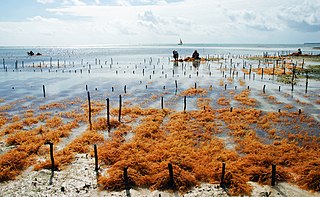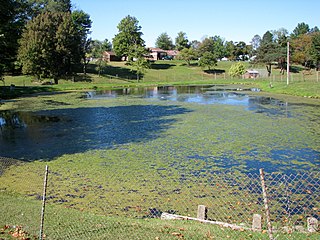Related Research Articles

Algae are any of a large and diverse group of photosynthetic, eukaryotic organisms. The name is an informal term for a polyphyletic grouping that includes species from multiple distinct clades. Included organisms range from unicellular microalgae, such as Chlorella, Prototheca and the diatoms, to multicellular forms, such as the giant kelp, a large brown alga which may grow up to 50 metres (160 ft) in length. Most are aquatic and lack many of the distinct cell and tissue types, such as stomata, xylem and phloem that are found in land plants. The largest and most complex marine algae are called seaweeds, while the most complex freshwater forms are the Charophyta, a division of green algae which includes, for example, Spirogyra and stoneworts. Algae that are carried by water are plankton, specifically phytoplankton.

Biofuel is a fuel that is produced over a short time span from biomass, rather than by the very slow natural processes involved in the formation of fossil fuels such as oil. Biofuel can be produced from plants or from agricultural, domestic or industrial biowaste. Biofuels are mostly used for transportation, but can also be used for heating and electricity. Biofuels are regarded as a renewable energy source. The use of biofuel has been subject to criticism regarding the "food vs fuel" debate, varied assessments of their sustainability, and possible deforestation and biodiversity loss as a result of biofuel production.
In September 2021, Synthetic Genomics Inc. (SGI), a private company located in La Jolla, California, changed its name to Viridos. The company is focused on the field of synthetic biology, especially harnessing photosynthesis with micro algae to create alternatives to fossil fuels. Viridos designs and builds biological systems to address global sustainability problems.

Algaculture is a form of aquaculture involving the farming of species of algae.
The Aquatic Species Program was a research program in the United States launched in 1978 by President Jimmy Carter and was funded by the United States Department of Energy, which over the course of nearly two decades looked into the production of energy using algae. Initially, the funding of the Aquatic Species Program was to develop renewable fuel for transportation. Later, the program focused on producing bio-diesel from algae. The research program was discontinued in 1996. The research staff compiled their work and conclusions into a 1998 report.
Pyrolysis oil, sometimes also known as bio-crude or bio-oil, is a synthetic fuel with limited industrial application and under investigation as substitute for petroleum. It is obtained by heating dried biomass without oxygen in a reactor at a temperature of about 500 °C (900 °F) with subsequent cooling, separation from the aqueous phase and other processes. Pyrolysis oil is a kind of tar and normally contains levels of oxygen too high to be considered a pure hydrocarbon. This high oxygen content results in non-volatility, corrosiveness, partial miscibility with fossil fuels, thermal instability, and a tendency to polymerize when exposed to air. As such, it is distinctly different from petroleum products. Removing oxygen from bio-oil or nitrogen from algal bio-oil is known as upgrading.
The United States produces mainly biodiesel and ethanol fuel, which uses corn as the main feedstock. The US is the world's largest producer of ethanol, having produced nearly 16 billion gallons in 2017 alone. The United States, together with Brazil accounted for 85 percent of all ethanol production, with total world production of 27.05 billion gallons. Biodiesel is commercially available in most oilseed-producing states. As of 2005, it was somewhat more expensive than fossil diesel, though it is still commonly produced in relatively small quantities.

Algal nutrient solutions are made up of a mixture of chemical salts and seawater. Sometimes referred to as "Growth Media", nutrient solutions, provide the materials needed for algae to grow. Nutrient solutions, as opposed to fertilizers, are designed specifically for use in aquatic environments and their composition is much more precise.In a unified system, algal biomass can be collected by utilizing carbon dioxide emanating from power plants and wastewater discharged by both industrial and domestic sources. This approach allows for the concurrent exploitation of the microalgae's capabilities in both carbon dioxide fixation and wastewater treatment.Algae, macroalgae, and microalgae hold promise in addressing critical global challenges. Sustainable development goals can be advanced through algae-based solutions, to promote a healthy global ecosystem.

Algae fuel, algal biofuel, or algal oil is an alternative to liquid fossil fuels that uses algae as its source of energy-rich oils. Also, algae fuels are an alternative to commonly known biofuel sources, such as corn and sugarcane. When made from seaweed (macroalgae) it can be known as seaweed fuel or seaweed oil.
TerraVia Holdings, Inc. was a publicly held biotechnology company in the United States. TerraVia used proprietary technology to transform a range of low-cost plant-based sugars into high-value oils and whole algae ingredients. TerraVia supplied a variety of sustainable algae-based food ingredients to a number of brands, which included Hormel Food Corporation, Utz Quality Foods Inc and enjoy Life Foods. TerraVia also sold its own culinary algae oil under the Thrive Algae Oil brand.
Sapphire Energy was a San Diego-based American energy company that aimed to produce crude oil with algae.

An aviation biofuel is a biofuel used to power aircraft and is a sustainable aviation fuel (SAF). The International Air Transport Association (IATA) considers it a key element in reducing the environmental impact of aviation. Aviation biofuel is used to decarbonize medium and long-haul air travel. These types of travel generate the most emissions, and could extend the life of older aircraft types by lowering their carbon footprint. Synthetic paraffinic kerosene (SPK) refers to any non-petroleum-based fuel designed to replace kerosene jet fuel, which is often, but not always, made from biomass.

The use of biofuels varies by region. The world leaders in biofuel development and use are Brazil, United States, France, Sweden and Germany.
Algenol, founded in 2009, headquartered in Fort Myers, Florida, Algenol is an industrial biotechnology company that is commercializing patented algae technology for production of ethanol and other fuels. The technology enables production four of the most important fuels using a proprietary process involving algae, sunlight, carbon dioxide and salt water.
Algae fuel in the United States, as with other countries, is under study as a source of biofuel.
The D66 strain of Chlamydomonas reinhardtii, a single-celled green alga, is a cell-wall-deficient strain of algae that exhibits normal photosynthetic characteristics, but requires ammonia as a source of nitrogen for growth. This strain of green algae is becoming an increasingly popular research organism due to its potential to be used as a source of biofuels. The D66 strain's potential to produce clean and renewable biofuel has also made it an increasingly important topic in the field of conservation biology.

The United States Navy's Great Green Fleet was an energy cost saving measure announced in 2009 to begin using a combination of conventional diesel fuel and biofuels in a 50/50 mixture. The first demonstration by the USS Nimitz carrier task group during RIMPAC in 2012 was completed without incident. The Great Green Fleet, the popular nickname, is an homage to the Great White Fleet of the early 20th century.
Sammy Boussiba is a professor emeritus at the French Associates Institute for Agriculture and Biotechnology of Drylands at the Jacob Blaustein Institutes for Desert Research at Ben-Gurion University of the Negev, Israel.
References
- ↑ "National Algae Association formed in US" Archived 2008-09-28 at the Wayback Machine , Biofuels Digest, January 21, 2008
- "Thurmond to lead algae effort", Biodiesel Magazine, September 2008 - ↑ "National Algae Assn.: U.S. Can Achieve Energy Independence With Help of Algae-Based Biofuels", BioFuels Journal, September 11, 2008. Archived from the original March 3, 2016.